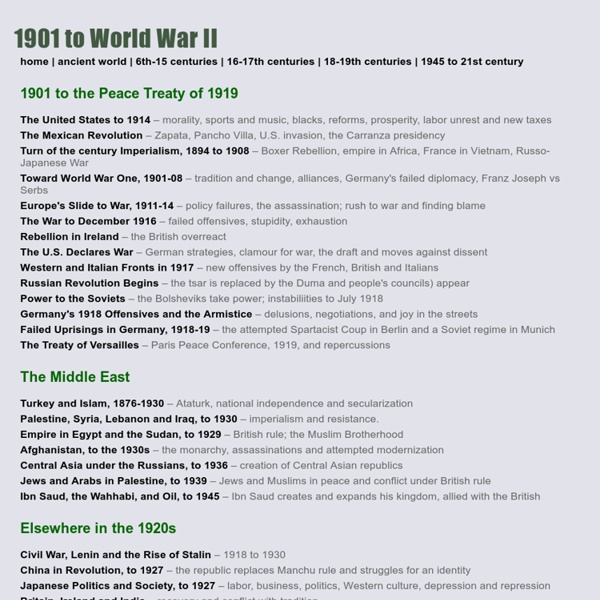



1920's Slang - Camarilla Wiki Welcome to White-Wolf.com. White Wolf Publishing has produced gaming universes for over 20 years including World of Darkness, Exalted, Trinity, and many more. White Wolf merged with CCP Games to focus on translating the World of Darkness IP into a massively multiplayer experience, and the North American office is fully dedicated to making this evolution a reality. In order to continue to support our existing RPG and LARP communities, we have entered into a number of partnerships with individuals and groups who can focus their full attention on the art forms White Wolf created and lived in. Digital Publishing and Print On Demand Both new and classic White Wolf products are available for digital download and Print On Demand through DriveThruRPG.com. ancient maps home page Down to: 6th to 15th Centuries | 16th and 19th Centuries | 1901 to World War Two | 1946 to 21st Century The Ancient World ... index of places Aegean Region, to 300 BCE Aegean Region, 185 BCE Africa, 2500 to 1500 BCE
Holocaust Timeline Jump to: 1938 1939 1940 1941 1942 1943 1944 1945 1933 January 30, 1933 - Adolf Hitler is appointed Chancellor of Germany a nation with a Jewish population of 566,000. February 22, 1933 - 40,000 SA and SS men are sworn in as auxiliary police. February 27, 1933 - Nazis burn Reichstag building to create crisis atmosphere. February 28, 1933 - Emergency powers granted to Hitler as a result of the Reichstag fire. March 22, 1933 - Nazis open Dachau concentration camp near Munich, to be followed by Buchenwald near Weimar in central Germany, Sachsenhausen near Berlin in northern Germany, and Ravensbrück for women. March 24, 1933 - German Parliament passes Enabling Act giving Hitler dictatorial powers.
The History and Geography of Inventions The tables below are divided by era. The lists are being enlarged all the time. There is also a search engine for more specific searches of the data. The following regions, empires and countries are listed (in chronological order): Africa, Europe, Mesopotamia, China, the Pacific, Middle East, New Guinea, Indus Valley, Ethiopia, Egypt, Yellow River, Sumeria, Central America, South America, Babylonia, Crete, Hittite, Phoenicia, Central Asia, Arabia, Etruria, Greece, Persia, Rome, Lydia, Mediterranian, Carthage, Syria, Pergamum, India, North America, Byzantium, Japan, England, Siam, France, Moorish Spain, Polar, Germany, Italy, Switzerland, Netherlands, Wales, Korea, Spain, Denmark, Brazil, USA, Scotland, Hungary, Belgium, Sweden, Austria, Russia, Norway, Turkey.
Nine Things Successful People Do Differently - Heidi Grant Halvorson Learn more about the science of success with Heidi Grant Halvorson’s HBR Single, based on this blog post. Why have you been so successful in reaching some of your goals, but not others? If you aren’t sure, you are far from alone in your confusion. It turns out that even brilliant, highly accomplished people are pretty lousy when it comes to understanding why they succeed or fail. The intuitive answer — that you are born predisposed to certain talents and lacking in others — is really just one small piece of the puzzle.
Human cycles: History as science Sometimes, history really does seem to repeat itself. After the US Civil War, for example, a wave of urban violence fuelled by ethnic and class resentment swept across the country, peaking in about 1870. Internal strife spiked again in around 1920, when race riots, workers' strikes and a surge of anti-Communist feeling led many people to think that revolution was imminent. The 1938 Radio Broadcast of 'The War of the Worlds' On the evening of October 30th, 1938, radio listeners were treated to a dramatic production of HG Wells' The War of the Worlds that was so original, and so convincing, that it apparently led some to believe that beings from the Red Planet had invaded America. The notorious broadcast, performed by the Mercury Theatre, a company run by a 23-year old ingenue named Orson Welles, took the 1898 science fiction novel and turned it into an ingenious radio play. Welles' conceit was to dress the broadcast up as a regular musical programme, and have it interrupted by reports of the extraterrestrial invasion fleet touching down in New Jersey. The absence of commercial breaks added to the versimilitude.
The Dalai Lama’s 18 Rules For Living May 6, 2011 | 42 Comments » | Topics: Life, List At the start of the new millennium the Dalai Lama apparently issued eighteen rules for living. Since word travels slowly in the digital age these have only just reached me. Here they are. Take into account that great love and great achievements involve great risk. The History and Geography of Inventions [Home Page][Other Page] [Search Inventions] [Before 10,000 BC][10,000 BC to 4000 BC][4000 BC to 3000 BC][3000 BC to 2000 BC][2000 BC to 1000 BC][1000 BC to 1 BC][1 AD to 1000 AD][1000 to 1500][1500 to 1700][1700 to 1800][1800 to 1850][1850 to 1900][1900 to 1950][Since 1950] [Inventions][Biographies][Religions of the World][Bible Contradictions][Rain][Countries of the World][Cookery][Music][Composers (Opera)]
Early Documentary Photography Harold Greengard, Twin Lakes, Connecticut, 1917 Paul Strand (American, 1890–1976) Silver-platinum print; 10 x 13 in. (24.5 x 33 cm) Ford Motor Company Collection, Purchase, Joseph Pulitzer Bequest and The Horace W. Goldsmith Foundation Gift through Joyce and Robert Menschel, and Gift of Ford Motor Company and John C. Waddell, by exchange, 1997 (1997.25) © 1997 Aperture Foundation Inc., Paul Strand Archive By the beginning of the twentieth century, photography was well on its way to becoming the visual language it is today, the pervasive agent of democratic communication.
Thinking like a genius: overview Thinking and recall series Problem solving: creative solutions "Even if you're not a genius, you can use the same strategies as Aristotle and Einstein to harness the power of your creative mind and better manage your future." The following strategies encourage you to think productively, rather than reproductively, in order to arrive at solutions to problems. "These strategies are common to the thinking styles of creative geniuses in science, art, and industry throughout history." Nine approaches to creative problem solving: